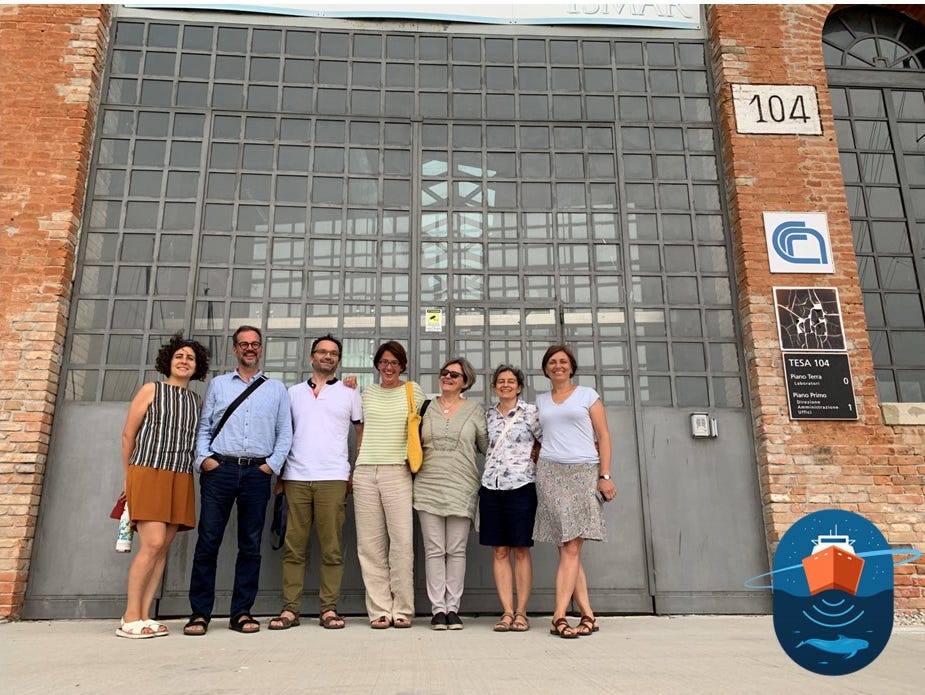Watch SATURN research on Euronews tonight!
plus: a new paper gives hope for reducing underwater noise by slightly slowing down vessels
SATURN on EURONEWS ‘Ocean’ Docuseries
Turn on your televisions tonight at 20:50 CET, because SATURN research will be featured in the next episode of the Euronews docuseries ‘Oceans’!
The programme will focus on the theme of underwater acoustics and show SATURN’s research into the sources and impacts of underwater radiated noise and promising solutions to reduce it. The filmmakers visited our partners in France, Germany, and Spain to capture the efforts being done from multiple institutions.
The episode will air at the times listed below, and will also be available the evening of Tuesday 26 June at euronews.com/ocean in multiple languages (you can switch the language in the website footer menu between English, French, German, Italian, Spanish, Portuguese, Russian and Hungarian).
EURONEWS TV (CENTRAL EUROPEAN TIME)
27/06 20:50
28/06 12:50, 22:50
29/06 5:50, 17:45
30/06 1:45, 14:50
01/07 08:50, 12:50, 19:50
02/07 13:45, 16:45, 22:50
03/07 11:50, 14:50
New Paper: Slowing down vessels can significantly reduce the impact of shipping noise on marine mammals
What can we do to reduce underwater radiated noise? One answer is surprisingly simple. SATURN researchers Charlotte Rose Findlay, Laia Rojano-Doñate, Jakob Tougaard, Mark P. Johnson, and Peter Teglberg Madsen of Aarhus University have just published an important paper in Science Advances showing that slowing down shipping vessels by small amounts can have a remarkable impact on reducing the sound they emit.
Findlay et al. investigated three ways to reduce ship noise impacts on marine mammals: slowing down ships; modifying the propeller and hull to make them quieter; and increasing the distance between marine mammals and ships. The results showed that the area impacted by vessel noise is dramatically reduced if ship source levels (the loudness of the ship) are reduced even by a small proportion. The findings show that a 6-decibel reduction in source can achieve 75% less area being exposed to underwater noise from a cargo ship. Only a 20% reduction in speed would be needed, e.g. from 20 to 16 knots.
“We show that moderate slowdowns are an immediate solution to the impacts of shipping noise on marine mammals. This approach does not require modifications to ships and can be supplemented by re-routing vessels away from critical habitats for animals and by changing the propeller to reduce vessel noise.”
Dr. Charlotte Findlay
Combining slowdowns with improvements to the ship hull and propeller (which SATURN is also researching), or increased distance of ships from areas with marine mammals, will reduce noise and impacts to animals even more.
The article is the cover story for the current issue of Science Advances, and is highlighted in a ‘Focus’ piece by the editors. It’s well worth a read!
Read the open-access article: https://www.science.org/doi/10.1126/sciadv.adf2987
See this Twitter thread from Charlotte Findlay, who answers some questions:
https://twitter.com/chazz_findlay/status/1671782397153624064

Video: Listening to Pilot Whales & Shipping Noise
We shared a video from Olivia Marín Delgado on our Instagram this week! Olivia describes the research being conducted at the University of La Laguna to assess the impact of underwater noise on Short-finned Pilot Whales in the Special Area of Conservation Teno-Rasca, located on the island of Tenerife, in the Canary Islands. English and Spanish subtitles available.
Can Marine Spatial Planning effectively mitigate the impacts of underwater noise?
In a new paper published this week in the journal Marine Policy, SATURN researchers from CNR-ISMAR reviewed both adopted and soon-to-be-implemented marine spatial plans in Europe to determine their effectiveness at mitigating the impacts of underwater noise.
Read the article here from Sofia Bosi, Emiliano Ramieri, Marta Picciulin, Stefano Menegon, Michol Ghezzo, Antonio Petrizzo, Thomas Folegot, Fantina Madricardo, Andrea Barbanti. https://www.sciencedirect.com/science/article/pii/S0308597X23002580
Other news:
SATURN Researcher Marta Solé of LAB UPC was recently interviewed for BBC Arabica. Arabic-speakers can watch the video here.
Our partners CNR-ISMAR and Quiet-Oceans held a stakeholder meeting last week on underwater noise impacts in the Adriatic Sea and MSP as a tool to manage them. More information on this case study will be shared on our website in the coming days.
With just 1.5 years left in the project, we have a lot of resources and results to share with you! If you know someone who would be interested in following along, you can share this newsletter and encourage them to subscribe.










